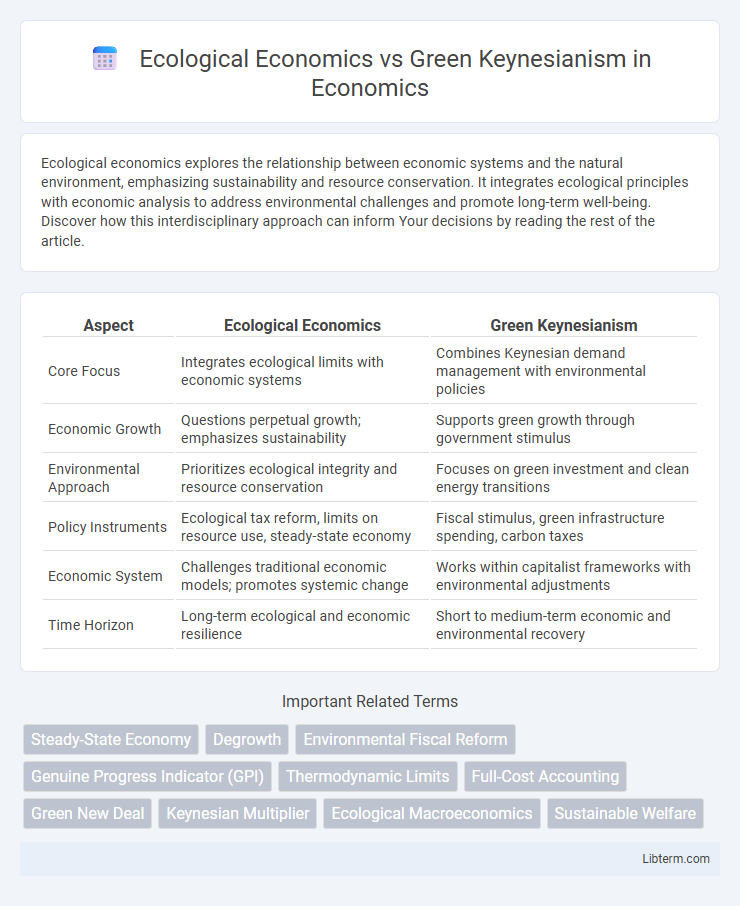Ecological economics explores the relationship between economic systems and the natural environment, emphasizing sustainability and resource conservation. It integrates ecological principles with economic analysis to address environmental challenges and promote long-term well-being. Discover how this interdisciplinary approach can inform Your decisions by reading the rest of the article.
Table of Comparison
| Aspect | Ecological Economics | Green Keynesianism |
|---|---|---|
| Core Focus | Integrates ecological limits with economic systems | Combines Keynesian demand management with environmental policies |
| Economic Growth | Questions perpetual growth; emphasizes sustainability | Supports green growth through government stimulus |
| Environmental Approach | Prioritizes ecological integrity and resource conservation | Focuses on green investment and clean energy transitions |
| Policy Instruments | Ecological tax reform, limits on resource use, steady-state economy | Fiscal stimulus, green infrastructure spending, carbon taxes |
| Economic System | Challenges traditional economic models; promotes systemic change | Works within capitalist frameworks with environmental adjustments |
| Time Horizon | Long-term ecological and economic resilience | Short to medium-term economic and environmental recovery |
Introduction to Ecological Economics and Green Keynesianism
Ecological Economics integrates environmental health with economic systems, emphasizing sustainability, resource limitations, and long-term ecological balance. Green Keynesianism advocates for government-led green investments and fiscal policies to stimulate economic growth while addressing climate change and environmental degradation. Both approaches aim to reconcile economic development with ecological preservation, but Ecological Economics prioritizes systemic sustainability and ecological constraints, whereas Green Keynesianism focuses on leveraging Keynesian demand management through green interventions.
Core Principles of Ecological Economics
Ecological Economics centers on sustainability, emphasizing the integration of ecological limits with economic activities to maintain natural capital and ecosystem services. It prioritizes steady-state economies, valuing long-term environmental health over short-term GDP growth, and incorporates ethical considerations such as intergenerational equity. This approach contrasts with Green Keynesianism, which supports green growth through government intervention and green investments while still operating within conventional economic frameworks.
Fundamentals of Green Keynesianism
Green Keynesianism emphasizes government intervention to drive sustainable economic growth by integrating environmental policies with fiscal stimulus. It advocates for public investments in renewable energy, green infrastructure, and job creation to reduce carbon emissions while maintaining economic stability. This approach aligns short-term demand management with long-term ecological goals, contrasting with Ecological Economics' broader critique of growth paradigms.
Economic Growth: Diverging Perspectives
Ecological Economics challenges traditional Economic Growth by emphasizing biophysical limits and advocating for steady-state economies that prioritize environmental sustainability over GDP expansion. Green Keynesianism supports continued growth through increased public investment in green technologies and infrastructure to stimulate demand and transition to a low-carbon economy. These diverging perspectives highlight a fundamental debate between prioritizing ecological balance and maintaining economic momentum within climate policy frameworks.
Environmental Policy Approaches Compared
Ecological Economics emphasizes the intrinsic value of ecosystems and advocates for sustainable resource management by integrating environmental limits into economic decision-making, promoting long-term ecological balance. Green Keynesianism focuses on stimulating economic growth through government investment in green technologies and infrastructure, aiming to achieve environmental goals alongside economic recovery. Environmental policy under Ecological Economics prioritizes strict regulatory frameworks and natural capital accounting, whereas Green Keynesianism relies on fiscal policies, subsidies, and market incentives to drive green innovation and employment.
Treatment of Natural Capital and Ecosystem Services
Ecological Economics emphasizes the intrinsic value of natural capital and ecosystem services, advocating for their preservation as fundamental to long-term economic sustainability. It integrates ecological constraints into economic models, treating natural capital as a non-substitutable asset essential for maintaining life-support systems. Green Keynesianism incorporates natural capital by promoting green investment and sustainable growth, but tends to rely on technological innovation and market mechanisms to address environmental issues rather than prioritizing ecological limits.
Role of Government and Market Mechanisms
Ecological Economics emphasizes the government's role in regulating markets to internalize environmental costs and protect natural capital, advocating for strict policies such as carbon taxes and resource caps. Green Keynesianism supports government intervention through fiscal stimulus and green investment to drive economic growth while integrating environmental objectives, relying more on market mechanisms guided by proactive public spending. Both frameworks agree on government involvement but diverge on market reliance, with Ecological Economics favoring precautionary limits and Green Keynesianism prioritizing demand-side management.
Sustainability Metrics and Indicators
Ecological Economics emphasizes comprehensive sustainability metrics integrating ecological, social, and economic indicators to assess long-term environmental health and resource limits. Green Keynesianism prioritizes economic growth with sustainability metrics focused on investment in green infrastructure, employment rates in renewable sectors, and carbon emission reductions. Both frameworks utilize distinct indicators: Ecological Economics highlights biophysical limits and ecosystem services valuation, while Green Keynesianism centers on economic stimulus impacts tied to environmental goals.
Challenges and Critiques of Each Approach
Ecological Economics faces challenges in integrating environmental limits with economic growth models, often critiqued for its perceived sacrifice of development and lack of practical policy frameworks. Green Keynesianism encounters critiques related to its reliance on continuous economic growth and government intervention, which may overlook ecological thresholds and long-term sustainability. Both approaches struggle with balancing environmental priorities and economic realities, highlighting tensions between ecological integrity and fiscal policies.
Future Directions for Sustainable Economic Policy
Ecological economics emphasizes integrating environmental limits and natural capital valuation into economic decision-making to ensure long-term sustainability. Green Keynesianism advocates for government-led green investment and fiscal policies to stimulate economic growth while reducing carbon emissions. Future sustainable economic policies should combine ecological economics' systemic resource management with Green Keynesianism's demand-driven approaches to foster resilient, low-carbon economies.
Ecological Economics Infographic

 libterm.com
libterm.com